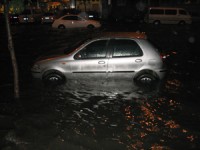How to Keep Your Business In the Black During the Floods
 To say that Queensland has faced some severe weather conditions over the past couple of months would be an understatement.
To say that Queensland has faced some severe weather conditions over the past couple of months would be an understatement.
Heavy rains, flooding, severe winds and mini-tornadoes have all played their role in affecting a large area of townships, rural and urban communities through the state. Some towns are still recovering from floods while others have had to face continued damages caused by recurring bad weather.
If you’re a business owner, whether in regional or urban Queensland, the damage caused by the conditions and intense flooding has possibly had an impact on the normal operations of your business. Even if your property wasn’t physically damaged by the floods, a lack of supplies due to the floods cutting off freight routes could mean your business is running low on stock.
While it’s hard to predict when hard times will occur, there are some things you can do to account for future floods or other disasters that could potentially limit your business operations.
Have a stock backup
Weather in Queensland has been fairly unpredictable over the past few years, with the state facing serious flooding more than anyone could’ve expected. While it’s not uncommon for businesses to stock up in preparation for events that could lead to a growth in business (e.g. a nearby festival), but backup stocks could also be a wise investment during the periods where the likelihood of severe weather conditions increase.
For Queensland, summer spells the most danger, with increased risks of fires, as well as the arrival storm season. Of course, the option to backup items and produce may not be an option for businesses. So while you may be able to get backup supplies of longer lasting perishable foods, backups of goods such as fresh milk, bread and baked goods won’t be as applicable.
Research different logistics / freight services
Depending on the location of your business, it could be a smart idea to consider your logistics / freight service provider. Chief among your concerns should be their reliability and location. Obviously, the more reliable the freight provider, the better. But if they’re a more localised logistics provider, this could also be beneficial.
While not all your produce can be sourced from local regions, if you can reduce the length between your logistic provider and your business, this also helps reduce the likelihood they’ll encounter impassable routes along the way. Nothing is guaranteed, so you should also look into how certain logistics companies create contingency plans for unpredictable but possible events such as severe floods or other comparable natural disasters that could impact on deliverability.
Cover your business
While this may be an obvious answer, insurance can go a long way in helping your business out in the face of natural disasters and the ensuing downtime it could cause for your operations. There are two types of insurance you’d want to look into for your business to account for financial losses and damage to property that could emerge in the face of a disaster.
First of all, there is fire and perils insurance, which exists to cover the costs of required repairs or restoration to a damaged commercial property. While this will cover repairs, this won’t provide you with any financial support to account for lost profits. Financial support is provided through business interruption insurance, which provides you with a type of business income to sustain it while its operations are severely impaired or at a complete halt due to rebuilding.
To those families and businesses who are still rebuilding after the devastating weather conditions that have made their way through Queensland over the past two months, we wish you all the best and hope the road to recovery is making notable progress.